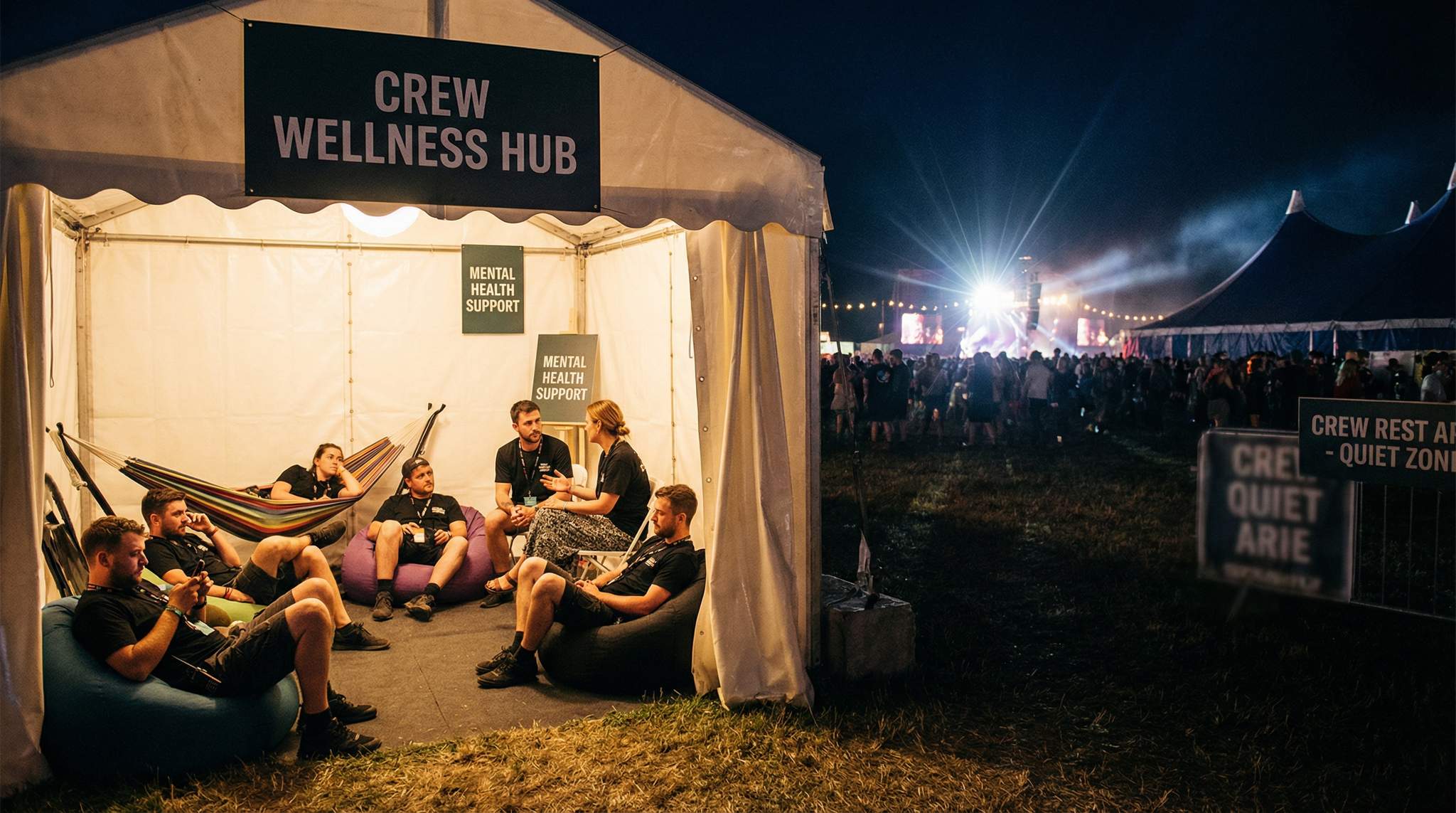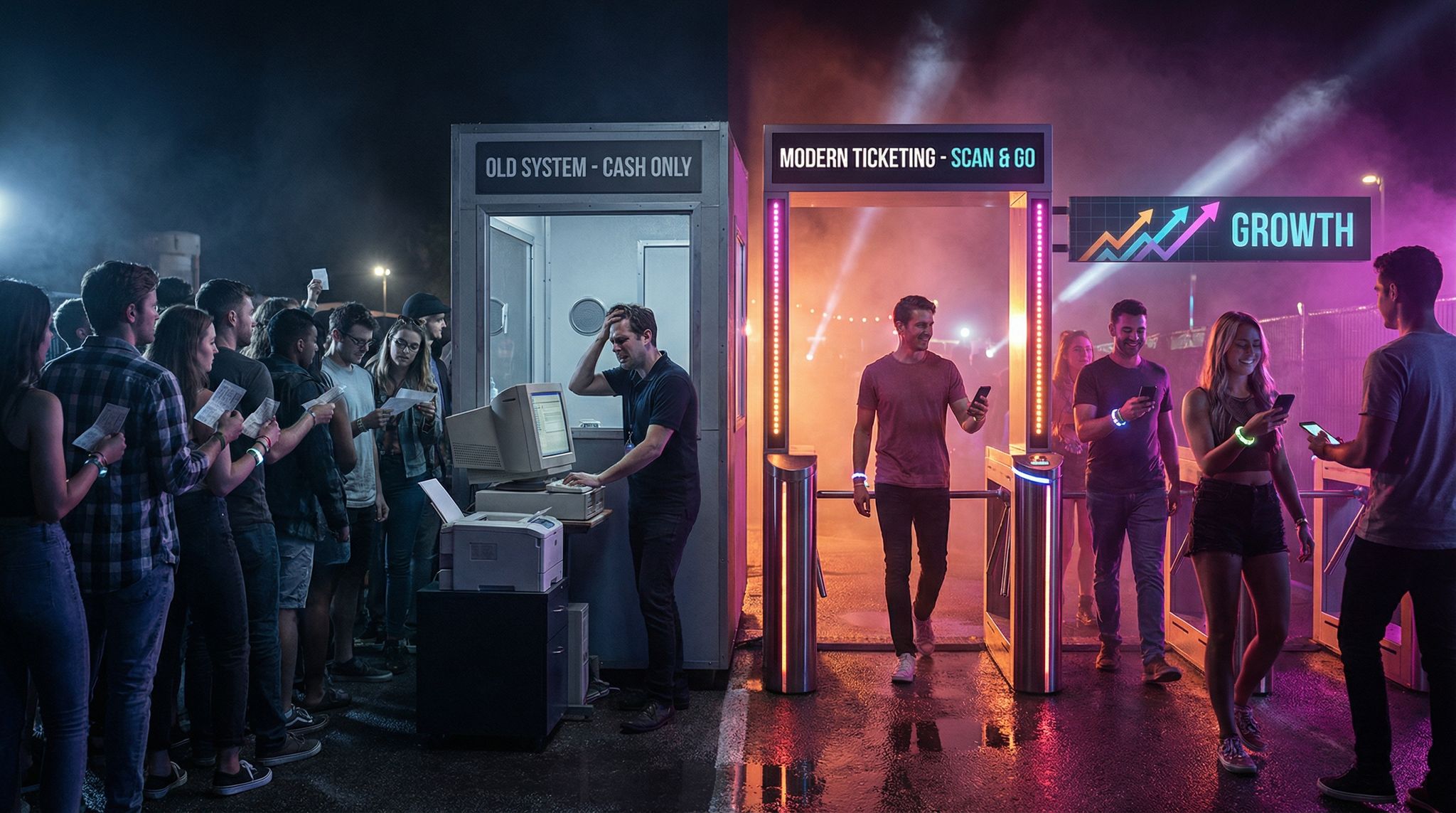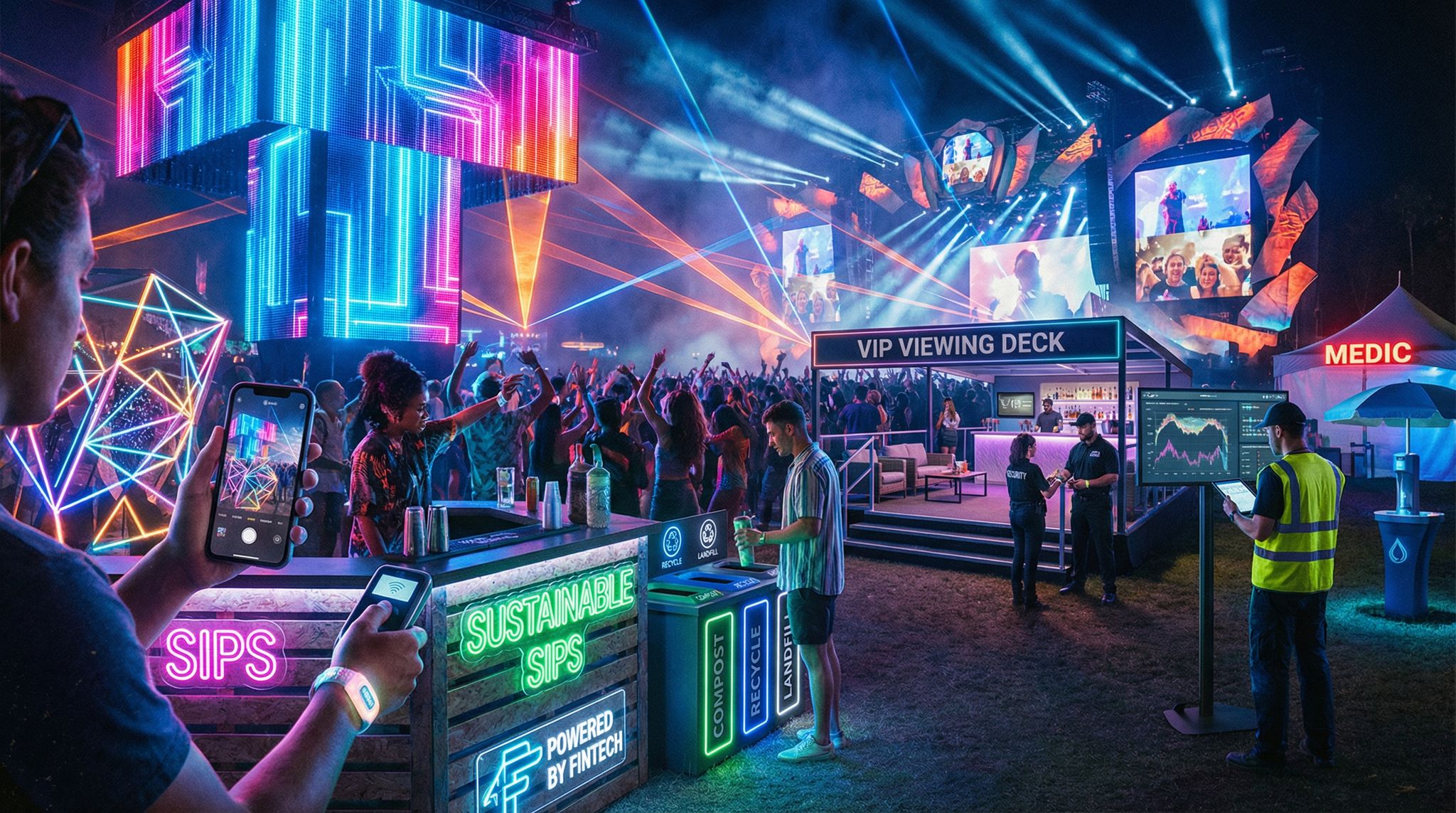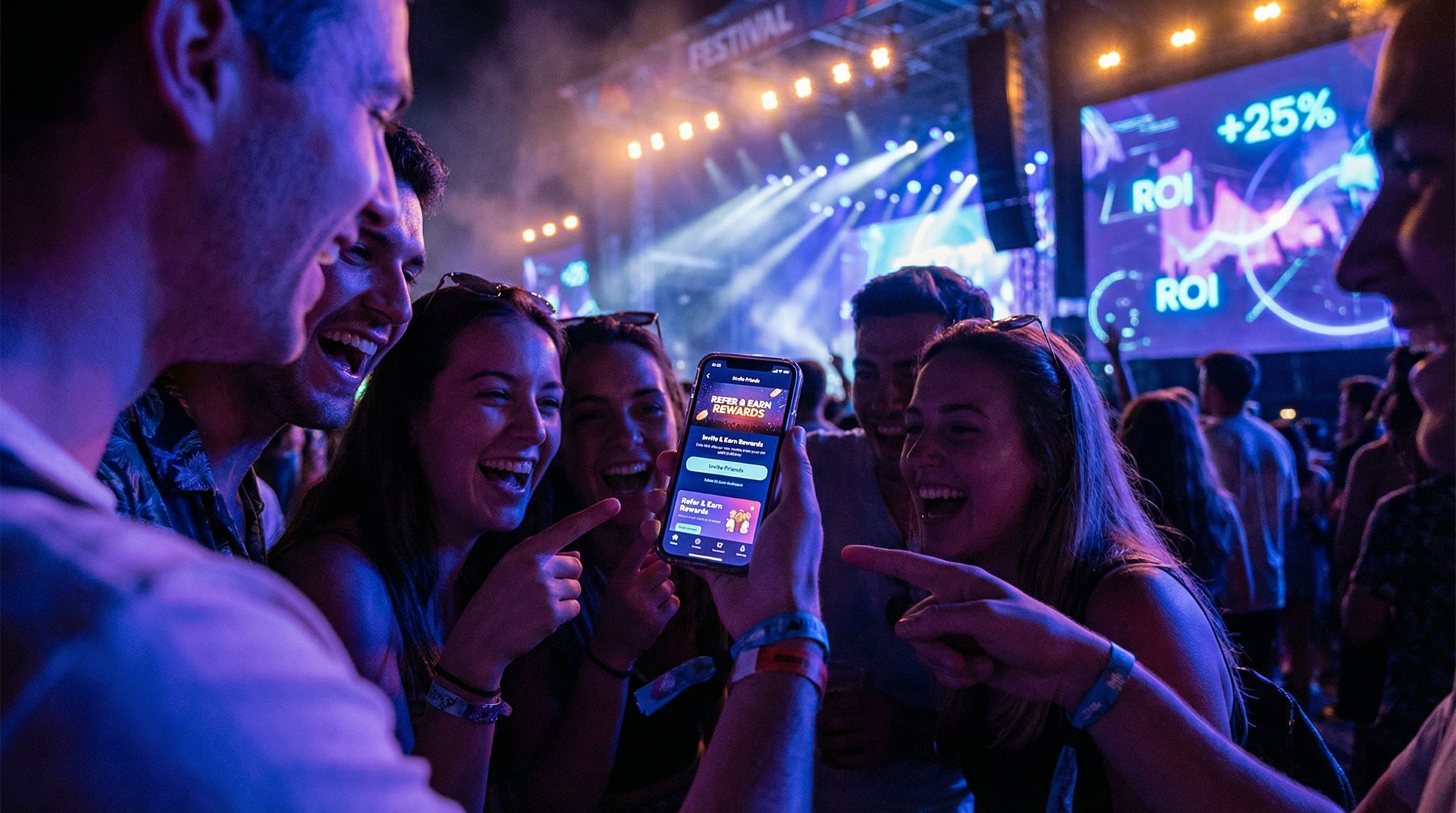Introduction
Festival production crews operate under intense conditions. Back-to-back 12+ hour days, high-pressure problem solving, and the physical demands of building and running a festival can take a serious toll. Over time, these grueling hours and stress levels can lead to burnout – a state of emotional, mental, and physical exhaustion. The consequences of crew burnout are far-reaching: decreased productivity, more mistakes or safety incidents, high staff turnover, and even health crises on-site. Forward-thinking festival producers recognise that caring for crew mental health is not just compassionate – it’s essential for crew & team management and the overall success of the event.
In recent years, the live events industry has started openly addressing mental health challenges among staff. It’s no longer an afterthought; it’s becoming standard to have strategies in place to prevent burnout and support crew well-being. This shift is driven by hard lessons and clear benefits – a motivated, healthy team delivers a smoother, safer festival. Below, we explore practical, actionable steps festival organisers around the world are taking to protect their production teams’ mental health.
Implement Reasonable Rotation Schedules
One of the most effective ways to combat burnout is by managing crew scheduling wisely. Avoid marathon shifts that push crew past their limits. Instead, design rotation schedules that cap maximum hours and enforce regular breaks. For example, rather than having a stage technician work 16 hours straight through a festival day, schedule two 8-hour shifts or three shorter shifts with breaks in between. Many large festivals like Glastonbury in the UK or Coachella in California operate nearly 24/7 during event days – but they do so by rotating teams. No one person should be on duty continuously from morning sound checks to the last post-midnight encore.
Fair rotation also means sharing the tough shifts. If overnight or early-morning work is required (for instance, for stage resets or site cleanup), rotate those duties among the team across the festival week. This prevents the same individuals from bearing all the hard hours. As an example, the production crew at Australia’s remote Rainbow Serpent Festival implemented a rotation where crew were split into A/B teams; while Team A rested, Team B worked, swapping every 6-8 hours. This ensured everyone got some downtime even during a 24-hour production cycle.
Importantly, build buffer time into the schedule. If a particular setup runs late, crew shouldn’t immediately roll into the next assignment without any rest. Stagger shift handovers with a short overlap so outgoing crew can brief incoming crew, and then get away to rest. Wise scheduling is a cornerstone of crew management – it not only protects well-being but also reduces mistakes that happen when people are overtired.
Encourage Breaks and Provide Downtime Areas
Even during a frenetic festival, no crew member should feel like they can’t take a breather. Encourage regular breaks and make it easy for staff to step away from the chaos briefly. Scheduling short breaks (even 10-15 minutes every few hours) can reset a frazzled mind and help maintain focus. To facilitate this, create dedicated crew downtime areas where team members can relax off-duty.
Planning a Festival?
Ticket Fairy's festival ticketing platform handles multi-day passes, RFID wristbands, and complex festival operations.
A well-designed crew rest area might be as simple as a tent or trailer outfitted with shade, comfortable chairs, water, and basic snacks. The key is that it’s away from loud stages and crowds – a place to decompress. Some festivals set up a quiet crew lounge behind the scenes; for example, Tomorrowland in Belgium has provided a crew “chill-out” tent stocked with cold drinks and earplugs so staff can cool down and escape the noise for a moment. Glastonbury Festival crew have access to separate crew camping and a rest zone removed from audience areas, ensuring they can actually sleep and recharge despite the 24-hour buzz of the event.
For multi-day events, consider overnight rest facilities. Crew who are working late should have a safe place to sleep when they’re off shift – whether it’s on-site camping, a bunk in a staff trailer, or transport to nearby lodging. At remote festivals like Burning Man (Nevada, USA) or Wonderfruit (Thailand), organisers create entire crew camps with sleeping quarters, shade structures, and even quiet hours enforced so off-duty staff can get genuine rest in shaded sleeping areas. Even at urban festivals, setting aside a backstage room as a nap area or quiet room can be a lifesaver for a crew member who’s hit a wall midday.
Enforcing breaks is as important as offering them. Festival managers should actively remind crew to take five, drink water, and grab a bite. During morning briefings, leaders can set expectations by saying, “We have a busy day, but everyone must take their scheduled breaks – no exceptions.” Backstage, use rotation or extra floaters to cover positions so each person can step away briefly without guilt. This proactive break culture fights the mentality that anyone has to “power through” exhaustion – instead, rest is framed as part of doing the job safely and well.
Foster a Supportive Team Culture
Culture plays a huge role in preventing burnout. Festival crews often take pride in being tough and resourceful, which is admirable – but it can also lead to a “no weakness” mentality where people hesitate to admit they are overwhelmed. Combat this by fostering an environment where asking for help or taking a break is encouraged, not judged.
Start with training and communication. In pre-festival orientations or training sessions, include a segment on mental health awareness. Teach crew members and supervisors how to recognise signs of burnout and stress in themselves and others – such as irritability, chronic fatigue, slips in concentration, or withdrawal from colleagues. Make it clear that speaking up about needing a break or feeling stressed is a sign of professionalism, not weakness. When festival organisers set this tone from the top down, it normalises self-care and looking out for one another.
Many festivals are appointing dedicated Crew Welfare or Wellbeing Officers on their teams. These individuals (sometimes experienced crew leaders or people with training in mental health first aid) circulate during the event to check on staff, boost morale, and be a confidential ear if someone is struggling. Additionally, providing quiet, confidential spaces for staff ensures they have somewhere to turn. For instance, major European festivals like Roskilde (Denmark) and Boomtown Fair (UK) have been known to assign crew welfare coordinators who ensure staff have access to water, ear protection, and also lend an ear for emotional support. Having an official crew welfare rep sends the message that the festival genuinely cares about its team’s wellbeing.
Need Festival Funding?
Get the capital you need to book headliners, secure venues, and scale your festival production.
Encourage peer support networks as well. Implement a buddy system, pairing up crew members for mutual support (especially new recruits with veterans) so they can watch out for each other. A buddy might notice if their partner is looking exhausted or stressed and remind them to take a break or ask a supervisor for help. Team leaders should also do quick mental health check-ins: a simple daily huddle where everyone shares how they’re doing or a thumbs-up/down indicator can reveal if someone’s morale is slipping.
Positive reinforcement and camaraderie go a long way, too. Celebrate small wins and acknowledge the hard work crew put in each day. Something as simple as a shout-out in the staff meeting (“Stage crew did an amazing job turning that set in under 30 minutes despite the rain – thank you!”) or providing some treats (like ice creams on a hot afternoon, or coffee and doughnuts for the dawn shift) can boost morale. When people feel valued and part of a team, they are more likely to communicate openly about their challenges and less likely to burn out in isolation.
Provide Access to Mental Health Support
Even with a great culture and schedule in place, some crew will face personal mental health challenges during an event. Long days away from family, high-pressure problem solving, and sheer physical exhaustion can trigger anxiety or other issues. Providing professional support resources can make a huge difference.
Many progressive festival organisers now offer on-site mental health support for staff. If budget and scale allow, consider having a trained counsellor or psychologist available on the festival crew or on call. Some large events set up a small wellness tent or private area for staff, separate from the attendee medical facilities. For example, the Glastonbury Festival in the UK has historically offered a welfare tent primarily for attendees, but crew can also seek support there. In recent years, some festivals have expanded this concept: Bonnaroo in the US experimented with a staff “safe space” where crew could speak with a counsellor or just unwind in a calm environment away from the stages.
If an on-site counsellor isn’t feasible, make sure crew at least have information to reach mental health helplines or support services. In Australia, for instance, the non-profit Support Act operates a Wellbeing Helpline specifically for music industry workers (including production crew) that offers free, 24/7 counselling sessions and crisis support. Simply publicising such resources – via crew newsletters, briefing materials, or posters in crew areas – shows staff that help is available and encouraged. Other examples include Backline Care in the US, which connects music industry professionals to mental health and wellness providers, and Music Support in the UK, which offers a helpline and peer support for event crew and artists dealing with stress or addiction.
Don’t underestimate peer support as a form of mental health care. Sometimes just providing a forum for crew to talk about stress can prevent a spiral. This might mean organising optional, confidential group discussions at the end of particularly challenging days or bringing in a mental health facilitator to lead a debrief session. For touring festival productions, some companies have started hosting brief “road counselling” sessions: for example, Live Nation’s Tour Support initiative gives touring crews access to therapists via phone or online, acknowledging that the grind of constant events requires ongoing support.
Lastly, ensure your team knows emergency procedures for mental health crises. Much like having a medic for physical injuries, have a plan if a crew member experiences a panic attack or other mental health emergency. Identify who in management is the go-to person to discreetly arrange relief for that crew member and get them help (whether it’s onsite medical, a counsellor, or even transport to an off-site clinic if needed). Treat mental health with the same urgency and care as physical safety – both are equally important.
Invest in Physical Well-Being to Support Mental Health
Mental health doesn’t exist in a vacuum; it’s closely tied to physical wellness. To prevent burnout, festival organisers must also invest in the physical well-being of their crew, which in turn bolsters mental resilience.
Proper nutrition and hydration are fundamental. Hungry, dehydrated people become fatigued and irritable much faster. Ensure there are ample meals and snacks for staff throughout the event. Many festivals arrange crew catering with hot meals or provide meal vouchers for vendors. Take inspiration from events like Fuji Rock Festival in Japan, where crew are served nutritious bento boxes backstage, or Exit Festival in Serbia, which offers free cafeteria-style meals to all staff and volunteers. Additionally, keep water stations backstage and at all major crew posts – especially for outdoor summer festivals – so that staying hydrated is effortless. Distributing refillable water bottles with the festival logo to crew not only builds morale but also encourages constant hydration.
Adequate rest and sleep are non-negotiable for physical and mental recovery. This circles back to scheduling and crew facilities: if the festival spans multiple days, do crew have a quiet place to sleep? For example, at Electric Picnic in Ireland, organisers provide a separate quiet camping zone for crew and artists away from the main public camping areas. Some events also arrange discounted hotel rooms or nearby accommodation for staff to get proper sleep off-site. Even a short power nap during a dinner break can help – perhaps the production office or the first aid tent can have a cot or two available for crew in need of a brief rest. Earplugs, eye masks, and scheduling at least 8 hours off between shifts help ensure the crew gets meaningful sleep.
Don’t forget about physical strain and recovery. Production work is very physical – heavy lifting, standing or walking for 10+ hours, exposure to heat, cold, or rain. These stressors can exacerbate mental fatigue. Mitigate physical strain by rotating labour-intensive tasks among more people, providing protective gear (like raincoats, gloves, sun hats, sunscreen), and encouraging stretching or light exercise. Some festivals have even brought in professional massage therapists or physios for a few hours to give crew quick muscle relief – a ten-minute shoulder massage can work wonders for someone who has been hauling equipment all day, and it doubles as a morale boost. Keeping the body cared for directly supports the mind.
Plan for Post-Festival Decompression
The push to execute a festival is intense, and it doesn’t stop when the music ends – crews often face a demanding teardown phase. To prevent burnout from carrying over or accumulating event after event, plan some form of post-festival decompression for the team.
One approach is to schedule recovery time for core crew. If possible, avoid having your key staff jump immediately into another project without any time off. Even a short break after the festival helps them recharge. Some companies mandate that employees take a few days off after a major event – this not only aids recovery but also shows staff that management respects their limits.
Another valuable strategy is to hold a crew appreciation gathering once the dust settles. After the festival is over (and everyone has caught up on sleep), host a low-key get-together or meal for the crew. Many festivals do this on the evening the site teardown is complete: a casual barbecue, pizza party, or jam session just for staff and volunteers. For example, Splendour in the Grass in Australia has treated crew to an end-of-festival dinner where directors personally thank the team, and crew members can swap stories about the event. This kind of celebration allows everyone to mentally transition out of “crisis mode” and end the event on a positive, communal note. It reinforces that their hard work was appreciated and helps them process the intense experience together – which can be therapeutic.
Also consider a debrief session focused on wellness in the days after the event. Discuss what challenges the team faced. Did anyone feel particularly stressed or unsupported? Gather feedback to improve your crew wellness plan for next time. Continuous improvement is key – every festival can learn and do better each year. Perhaps crew feedback will reveal that the night shift rotation was still too taxing, or that the rest tent was too far away from the main stage. Use those insights to refine your approach, showing your team that their well-being is an ongoing priority.
Conclusion
Preventing festival crew burnout is an ongoing effort that blends smart planning, compassionate management, and a commitment to a people-first culture. By implementing rotation schedules that balance the workload, encouraging breaks and providing restful spaces, offering mental health support, and nurturing a supportive team environment, festival organisers set their teams up for success. These measures aren’t just “nice to have” – they directly impact safety, reliability, and the quality of work the crew delivers.
Around the world, leading festivals are demonstrating that looking after crew welfare pays off. Whether it’s a 50-person team at a local food festival or an army of thousands at global events like Tomorrowland or Glastonbury, the principle holds true: a cared-for crew is more motivated, makes fewer mistakes, and sticks around season after season. As an old event industry adage goes, “Take care of your crew and they’ll take care of the show.” In the high-stakes environment of live events, this couldn’t be more accurate. Prioritising mental health and preventing burnout isn’t just about avoiding negatives – it’s about actively enabling your team to be the best version of themselves, so they can create the best festival possible.
By treating crew members as valued partners – ensuring they get rest, support, and respect – festival producers can maintain a loyal, energised team year after year. The result? An amazing festival experience that is safe, well-run, and brimming with positive energy behind the scenes.





